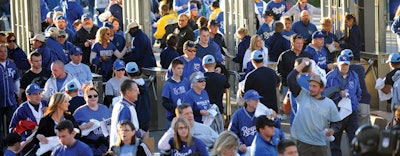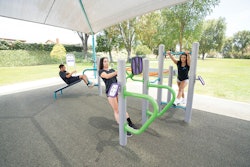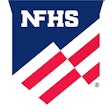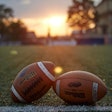The Boston Marathon bombings forced many in the sports community to reevaluate their respective security practices two years ago, but Major League Baseball was ahead of the curve in its commitment to improving safety and security at its events. "We were studying our security efforts prior to Boston, and we were deliberating enhancements when it occurred," says Michael Teevan, vice president of public relations for MLB. One of those enhancements was improving its entrance-screening process.
Toward the end of the 2013 season, MLB mandated that all 30 teams have some form of advanced metal detection process in place prior to Opening Day of the 2015 season. Leading by example, MLB rolled out metal detection screening of all fans at the 2013 All-Star Game, held at the New York Mets' Citi Field. After a successful first attempt, MLB implemented metal detectors at its highest profile event, the World Series. It repeated this process in 2014, as well.
The Boston Marathon bombings forced many in the sports community to reevaluate their respective security practices two years ago, but Major League Baseball was ahead of the curve in its commitment to improving safety and security at its events. "We were studying our security efforts prior to Boston, and we were deliberating enhancements when it occurred," says Michael Teevan, vice president of public relations for MLB. One of those enhancements was improving its entrance-screening process.
Toward the end of the 2013 season, MLB mandated that all 30 teams have some form of advanced metal detection process in place prior to Opening Day of the 2015 season. Leading by example, MLB rolled out metal detection screening of all fans at the 2013 All-Star Game, held at the New York Mets' Citi Field. After a successful first attempt, MLB implemented metal detectors at its highest profile event, the World Series. It repeated this process in 2014, as well.
"I think fans accepted it and they know why we're doing it," says Teevan. "I think they appreciate that it's an extra step that poses minimal inconvenience and they've welcomed it from the standpoint of safety."
And while a small sample size of fans welcomed the change, the unknown was how teams would respond to the compliance mandate. "We have stressed to the clubs that this is a product of our work with the Department of Homeland Security and that these steps are sort of commonplace at public events," Teevan says. "The clubs have been really receptive to the guidance we've given them."
TEAM EFFORT
A number of teams began rolling out some form of metal detection at their stadiums last year, including the Seattle Mariners, although the Mariners didn't wait until the start of the 2014 season to test this new process out.
"We actually started testing them at our annual fan fest at the end of January, and then we began using them on a phased-in basis over the first couple months of the season," says Rebecca Hale, the Mariners' director of public information. "Our plan was that by the All-Star break we would be fully operational with walkthrough metal detectors at all public entrances to the ballpark."
As was the case with All-Star Game and World Series attendees, Mariners fans were receptive to the new security measure, but a key component to that success was education. Says Hale, "We had people communicating with them in terms of how to prepare to have the quickest experience possible. So they were ready, knowing what items they needed to remove and put in the bowl, which allowed them to walk through without setting off an alert."
The Mariners' own education involved the technology itself. There are numerous discriminatory factors that can be set with today's walkthrough detectors — keeping them from sounding an alarm at the presence of watches, rings or belt buckles, for example — all while accurately detecting more dangerous items, including actual weapons.
"Walkthrough metal detectors only take a few seconds and you can get far more people through versus using handhelds, which is important in reducing lines and wait times," says Luca Cacioli, director of operations for CEIA USA, the security screening company MLB consulted when evaluating how to best implement this new security measure.
THE WAITING GAME
Longer wait times are inevitable, however. Not only will there be fans who will be required to go through the secondary screening process, but there will be those who have no choice — wheelchair-bound attendees or those with pacemakers, for example, cannot go through a walkthrough metal detector.
There are steps teams can take to alleviate some of that stress, starting with opening the gates earlier. Last year, for expected big attendance games or promotions, the Mariners opened the gates an hour earlier than normal. They also used a more structured queuing system so fans would know they were in line to enter the stadium instead of large groups simply loitering outside the gates or on the sidewalks.
"We had almost like a bank teller setup, and that really helped speed people through the gates," says Hale, cautioning all teams to expect some disgruntled fans in those long lines, especially at the start of the season. "There will be long lines. Fans are going to arrive when they are going to arrive, so you need to be prepared for the big rushes of arrivals at certain times."
Ultimately, though, Cacioli is confident that fans will embrace the new security steps, as they have done at other events. "Nowadays, fans understand that those extra couple minutes getting in are worth it to feel safer for the next few hours," he says. "It just allows greater peace of mind."
A NEW ERA
Despite some expected uncertainty, Teevan has no doubt all teams are ready for this new era is entrance security. "We fully expect everyone to be in compliance," says Teevan, explaining that a number of teams were in compliance months ahead of Opening Day. How those teams choose to be in compliance, however, is up to them.
"We've given clubs some latitude to decide what fits their market best," Teevan says. "It can be walkthrough magnetometers, it could be handheld wands, or it could be a combination of both. Clubs have some leeway to determine what system would work best for their fan base."
"Eventually, everything is going to smooth out," says Hale. "Fans are going to get used to it, and your staff is going to get very skilled at it."
This article originally appeared in the Spring 2015 issue of Gameday Security with the title "Worth the Wait"





































